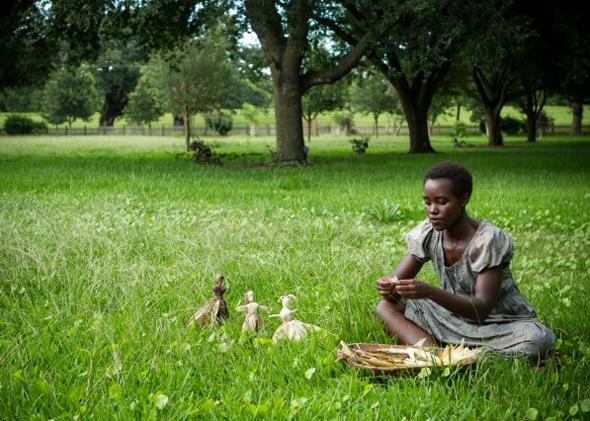Dear Stephanie, Mark, and Andrew (who I’m thrilled will be joining us midclub—hi, and welcome, Andrew!):
So at the end of the last round, Mark asked, with trepidation, if it’s time for us to launch into a discussion of one of the year’s most painful, powerful, difficult-to-process films, 12 Years a Slave. And then, just before my turn comes up, the Academy Award nominations are announced, and I only have time to dash off a few quick thoughts before I jump on a plane to Sundance. My considered critical question to you: How shallow does that make me look, in millimeters?
It’s in the nature of the Oscar race to hijack all interesting conversations about movies, Captain Phillips–style (and I agree by the way, Stephanie, that the 10 final transcendent minutes of that film take Tom Hanks’ acting to a place we haven’t seen in a long time, if ever). I promise I won’t let our multithreaded discussion veer too far down the red carpet, but the Oscars are the Oscars; their vestal fires burn, their gods must be propitiated. I actually feel like I’ve made my peace with the annual gold rush now, since reading James F. English’s great book The Economy of Prestige. As he demonstrates persuasively, the hold prize culture has on us is so powerful that any attempt to set oneself above the fray only serves as another useful cog in the machine of differential valuation that keeps the whole thing running.
So I promise to return to 12 Years in our next round (and please get started without me if you like). But first, a few observations about this morning’s predawn rites: The biggest puzzle for me is why the Coen Brothers’ Inside Llewyn Davis, a near-universal presence on top-10 lists throughout the land and certainly a far more accessible movie than their Oscar-winning No Country for Old Men, has been entirely shut out of the major awards (though it did get some recognition in the technical categories, including a nod for its magic-making DP, Bruno Delbonnel, for his cinematography). The lost opportunity to see “Please Mr. Kennedy” performed live at the ceremony on March 2 fills me with a desolation deeper than Smaug’s. (My colleague Forrest Wickman made a compelling case that the song should have been eligible for consideration.) J.C. Chandor’s minimalist survival adventure All Is Lost, with that magnificent one-man performance by Robert Redford, was similarly dissed. It’s a lovely thing to see the name Barkhad Abdi, a Somali-American resident of Minneapolis acting in his first film role, nominated for Best Supporting Actor as the head of the terrified pirate crew in Captain Phillips. But it seems odd not to see Hanks’ name across the way in the Best Actor lineup, given how interdependent his performance and Abdi’s were. Apparently both Forrest Gump and the Sundance Kid are, in the eyes of the Academy, sufficiently Oscar’d up already. The absence of Nicole Holofcener’s Enough Said as a nominee in any category isn’t a shock—comedy traditionally gets overlooked at the Oscars—but it would have been sweet to see Holofcener’s sparkling, smart script (as you say, Mark, a writer’s script)—on the list for Best Original Screenplay, or to see James Gandolfini get a nod for Best Actor in his next-to-last performance, and one of his finest. At least we will get to see Lupita Nyong’o, nominated for Best Supporting Actress for her astonishing work in 12 Years, work the awards circuit in all kinds of fabulous couture, radiating loveliness from every seemingly individually illuminated pore. That makes up for a lot.
I need to get on this plane to the land of powdery snow and skinny starlets—Andrew, you’re up!
XO,
D
Sent from my iPhone
